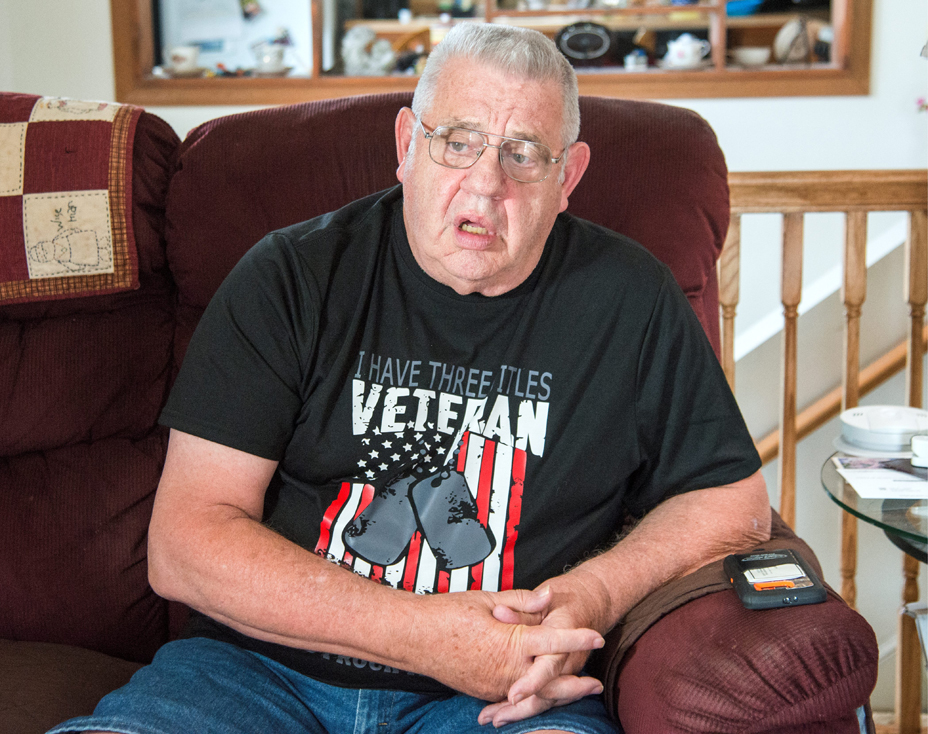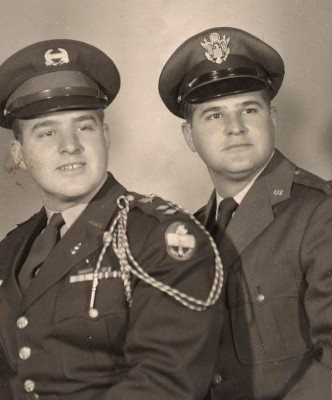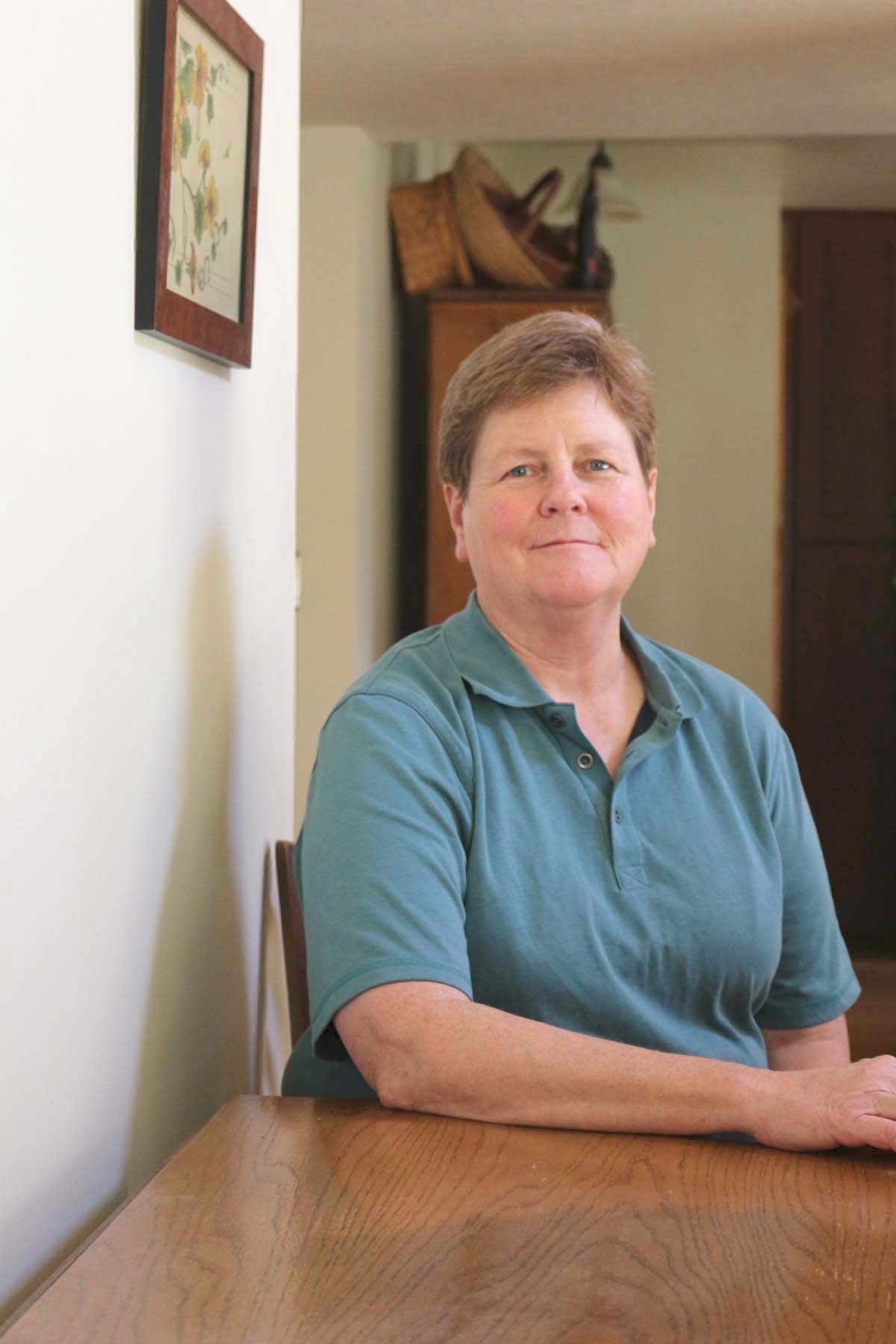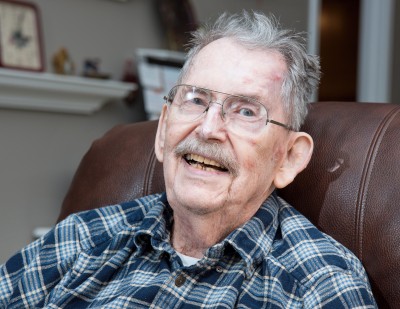Mike Lueth
By Paul Wood

Photo By Robin Scholz/The News-Gazette
PHILO — Mike Lueth always had cigarettes with him in Vietnam. Not that he smoked. They were good for burning leeches off Marines after they had waded through a jungle river, and offered some warmth when his unit was in the wind, including on a mountain the Air Force bombed after it was already taken.
His family was from Champaign, but he grew up in Alabama, and that’s where he was in 1962, a year after graduation, wondering what he would do for a living.
Lueth, now 74, decided on the Navy. Like many, he didn’t want to dig foxholes, eat C-rations or get shot at.
But the Marines needed corpsmen to help wounded men, so for 17 months, he was in the Marines, where he had to dig foxholes, eat C-rations and get shot at, he says, laughing.
The Marines are a branch of the Navy.
After signing up, he spent 2 1/2 years back in Illinois at Naval Station Great Lakes, the home of the Navy’s only boot camp. From there, he was sent for Marine training, assigned to the 1st Marines on a Wednesday and shipped out that Friday.
He was able to see Okinawa and the Philippines the Marine way, in the jungle — “wet, hot, sticky and full of leeches and mosquitoes.”
His company was being trained for a war most Americans had not ever heard of yet, in a torn country that France had failed to subdue.
“I’ve been told this was the first Raider Battalion since the Korean War,” he said. “The Marines were the best group you could be with.”
The Marines would usually go on missions for two or three days at a time, Lueth said, then return to the ship.
In December 1965, his company was in Phu Bai Combat Base, then an Army and Marine Corps base south of Hue in central Vietnam. The war movie “Full Metal Jacket” (1987) is partly about action in Phu Bai and in Hue.
“Our company did a lot of perimeter and outpost duty,” he said.
At one base, there was a Viet Cong training camp right across the way, Lueth recalled.
“There were firefights at night, and in broad daylight, we’d help return the bodies,” he said.
He thought he saw lightning over the Ho Chi Minh trail, but it was actually bombs going off. Another time, he took a trip through Hue, unaware it was held by the Viet Cong.
Lueth said there were only “three of four” times his unit was under heavy fire with Marines down. In one company of more than 100 Marines, he said, “only 13 or 14 were able to report” after a firefight nearby.
In the worst instance for Lueth’s company, “I treated a point man with a through and through on his side,” he said.
In another case under fire, he was about to hide behind an earthen bank when “the bank got shot to smithereens.”
But when he was transferred to a hospital in Danang, the situation greatly improved. For one thing, there was China Beach to relax on.
But unlike the old TV show of the same name, there were no pretty nurses to chase.
“The Marines didn’t have female nurses then,” Lueth said.
He came home in 1966. Unlike later veterans, he did not face hostility from the antiwar movement, which had not revved up yet. The Tet Offensive early in 1968 galvanized many with the idea that a war in Vietnam could not be won.
“I didn’t tell people I’d been in service,” he said.
Unlike World War II and Korean War veterans, Lueth didn’t feel much of a welcome at first from the American Legion or Veterans of Foreign Wars. But now he’s the commander of the Philo American Legion and a member of the Marine Corps League.
He and wife Theresa are the parents of a son and daughter, and grandparents of a boy and girl.
Do you know a veteran who could share a story about military service? Contact staff writer Paul Wood at pwood@news-gazette.com.
Read more stories from local veterans:
 The Ellenberger-Brown family
Southwest of Champaign, Richard and Sheryl Brown Elllenberger live a life that has included being officers — she a capta …
The Ellenberger-Brown family
Southwest of Champaign, Richard and Sheryl Brown Elllenberger live a life that has included being officers — she a capta …
 Meg Miner
MANSFIELD — Meg Miner served during the Persian Gulf War, but she later had some doubts about her country’s actions. The …
Meg Miner
MANSFIELD — Meg Miner served during the Persian Gulf War, but she later had some doubts about her country’s actions. The …
 Fred McCauley
CHAMPAIGN — In September 1952, recent MIT graduate Fred McCauley came to Korea to serve as a forward observer for a mort …
Fred McCauley
CHAMPAIGN — In September 1952, recent MIT graduate Fred McCauley came to Korea to serve as a forward observer for a mort …